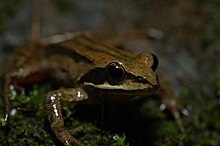Korean brown frog
 From Wikipedia the free encyclopedia
From Wikipedia the free encyclopedia
| Korean brown frog | |
|---|---|
 | |
| Scientific classification | |
| Domain: | Eukaryota |
| Kingdom: | Animalia |
| Phylum: | Chordata |
| Class: | Amphibia |
| Order: | Anura |
| Family: | Ranidae |
| Genus: | Rana |
| Species: | R. coreana |
| Binomial name | |
| Rana coreana Okada, 1928 | |
| Synonyms | |
| Rana temporaria coreana Okada, 1928 | |
The Korean brown frog (Rana coreana) is a species of frog in the genus Rana. It is native to the Korean Peninsula and Shandong, China.[2]
Taxonomy and systematics[edit]
The Korean brown frog has earlier mostly been considered as subspecies of Rana amurensis, that is, R. a. coreana. However, morphological and genetic analyses support its status as a distinct species, though closely related to R. amurensis.[3] The boundary between these two species is unclear.[1]
Until recently, Korean brown frog was considered Korean endemic. However, molecular and morphological evidence show Rana kunyuensis from Mount Kunyu in the Shandong province of China is the same species as Korean brown frog and its junior synonym.[2][4]
Description[edit]
It is the smallest of brown frogs in Korea, with males reaching up to 38 mm (1.5 in) and females to 44 mm (1.7 in) in snout-vent length.[5]
Habitat and conservation[edit]
The Korean brown frog inhabits coniferous, mixed and deciduous forests, shrublands, and grasslands. Most commonly it occurs in open, wet places (e.g., wet meadows, swamps, riverbanks, floodplains, etc.). They breed in shallow lakes, ponds, ditches, large puddles, and marshes. Hibernating frogs can be found in large numbers in the bottom mud of ponds and pools.[1]
Korean brown frog may be locally threatened by habitat loss, but this common species is not threatened overall.[1]
The now-synonymized Rana kunyuensis has been assessed as "Data Deficient" by the International Union for Conservation of Nature (IUCN).[6]
References[edit]
- ^ a b c d IUCN SSC Amphibian Specialist Group (2019). "Rana coreana". IUCN Red List of Threatened Species. 2019: e.T89108544A110101367. doi:10.2305/IUCN.UK.2019-1.RLTS.T89108544A110101367.en. Retrieved 12 November 2021.
- ^ a b Frost, Darrel R. (2015). "Rana coreana Okada, 1928". Amphibian Species of the World: an Online Reference. Version 6.0. American Museum of Natural History. Retrieved 8 January 2016.
- ^ Song, J.-Y.; Matsui, Masafumi; Chung, Kyu-Hoi; Oh, Hong-Shik; Zhao (2006). "Distinct specific status of the Korean brown frog, Rana amurensis coreana (Amphibia: Ranidae)" (PDF). Zoological Science. 23 (2): 219–224. doi:10.2108/zsj.23.219. hdl:2433/65039. PMID 16603814. S2CID 10206671.
- ^ Zhou, Yu; Yang, Bao-Tian; Li, Pi-Peng; Min, Mi-Sook; Fong, Jonathan J.; Dong, Bing-Jun; Zhou, Zheng-Yan; Lu, Yu-Yan (2015). "Molecular and morphological evidence for Rana kunyensis as a junior synonym of Rana coreana (Anura: Ranidae)". Journal of Herpetology. 49 (2): 302–307. doi:10.1670/13-111. S2CID 85751527.
- ^ "Rana coreana". AmphibiaWeb: Information on amphibian biology and conservation. [web application]. Berkeley, California: AmphibiaWeb. 2016. Retrieved 8 January 2016.
- ^ Li Pipeng, Xie Feng. (2004). "Rana kunyuensis". IUCN Red List of Threatened Species. 2004: e.T58636A11816906. doi:10.2305/IUCN.UK.2004.RLTS.T58636A11816906.en. Retrieved 26 April 2023.
